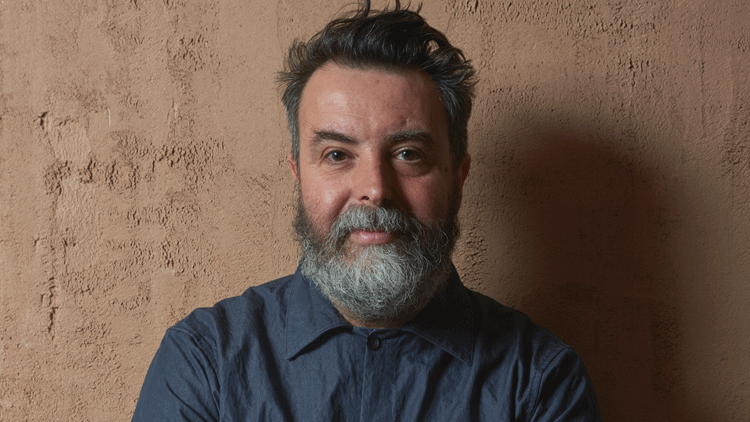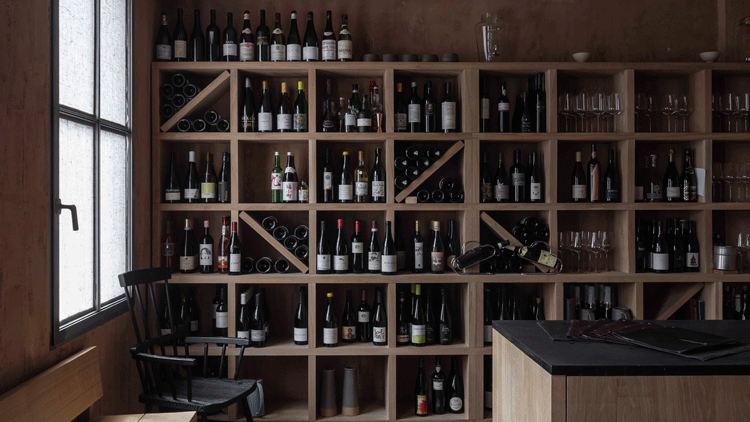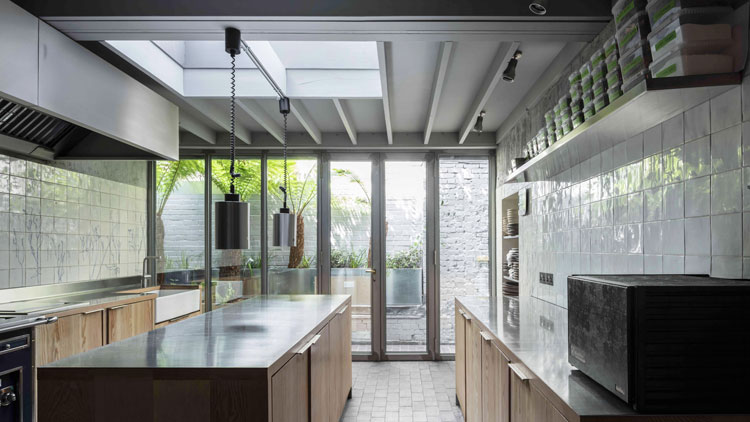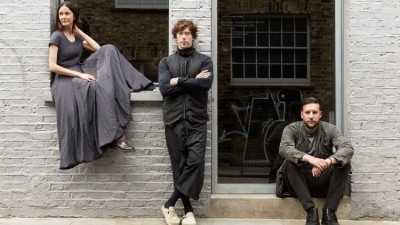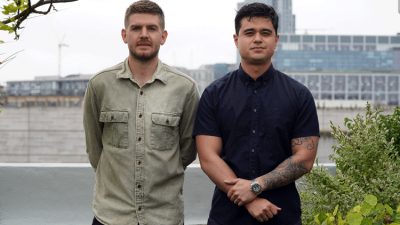"It’s a place where we can immerse ourselves in hospitality" Nuno Mendes on Mãos
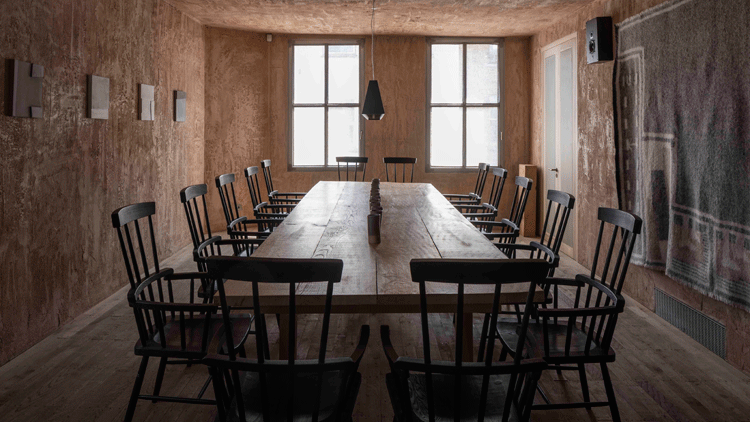
Accessed via an unmarked grey door on the corner of Redchurch Street and Chance Street in Shoreditch, Nuno Mendes’ latest project is part of the Blue Mountain School: a strange interdisciplinary hybrid of gallery and high-end retail that is as esoteric as it is expensive.
Mãos – which means ‘hands’ in Portuguese – is located on the first floor. After being greeted at the top of the dimly lit stairs, guests are shown through to the kitchen and invited to mingle as four chefs go about preparing their dinner.
One is cooking scallops in their shells curved side down on a small Konro yakitori grill. Every now and then, he tweezers a sprig of douglas fir on to the glowing embers to lend his charges – and the whole room – a subtle pine fragrance. Scallops are periodically removed to test for doneness by gently pressing the flesh and, if necessary, returned to the grill for a few seconds’ more heat.
Once cooked, the bivalves are handed over to two waiting chefs. One removes the coral and innards, another combines the cooking juices with sake to make a sauce. The scallop is then served to the guests in its shell.
It’s a process that would probably elicit an eye roll from a chef who works in a busy, traditionally run restaurant kitchen knocking out hundreds of plates a night. But it does make for a spectacular few bites of food. The perfectly cooked scallops are beautifully sweet as a result of being alive 10 minutes before being consumed, something that hardly ever happens in other kitchens.
A similarly painstaking cooking technique is employed to cook the next dish on the menu, a grilled beef short rib flavoured with yeast. Again, the meat is taken on and off the grill over and over again before being sliced and handed to guests wrapped in a wasabi leaf.
In case you hadn’t clocked it already, Mãos isn’t a restaurant. The venue is billed as a ‘kitchen table and wine room’, a curious experience that feels somewhere between a supper club and a private dinner party, only with much (much) better food, drink and service. The table seats up to 16 with bookings taken online via Superb, which works in a broadly similar way to the more well-known Tock ticketing system.
Mãos – which opened very quietly earlier this year – is in many ways an evolution of The Loft, the hugely influential supper club that Mendes started in 2008. “We’re having a great time.
It’s a place where we can immerse ourselves in hospitality. That’s hard to do these days,” says Mendes, who was born in Lisbon, attended culinary school in California and has worked for some of the world’s most high-profile chefs including Wolfgang Puck, Rocco DiSpirito, Jean-Georges Vongerichten and Ferran and Albert Adrià.
Nuno Mendes' CV includes Wolfgang Puck, Jean-Georges Vongerichten and the Adrià brothers
Normally there are just four services a week but Mãos is currently offering an extra ‘matinee’ service on Saturdays, which sees the experience start at about 3pm rather than the usual 7.30pm. The 16-odd course meal takes between three and four hours and costs £150 before drinks and service.
Cooking for so few people at once allows a huge amount of care to be given to simple tasks. “The food is not complicated. But we have the luxury of being able to focus on the little details,” says Mendes. “We can cut vegetables to order and shell peas moments before they’re eaten. The kobe beef for one of our dishes is carefully smoked for a couple of days above the grill – there’s no way you could do that in a normal restaurant environment.”
The price point and manner in which the kitchen runs also means the team can use ingredients for which supply is limited and inconsistent. With a clearer idea of what stock will be needed than most restaurants, the team also has the flexibility to age products in-house and serve them at exactly the right moment.
Freeform food
The food at Mãos has some references to Viajante, the Michelin-starred restaurant Mendes ran in Bethnal Green between 2010 and 2014. Meaning ‘journey’ in Portuguese, it served a very modern fusion of Portuguese and Japanese food. The food at Mãos, however, is more freeform. “We want to cook whatever the hell we want to cook. We don’t want to label it this or that. We cook things we like the way that we like. That’s a luxury. We’re having a lot of fun doing it.”
Other dishes on the menu on the night of our visit included red prawns, langoustines, dried cabbage and perilla; wild turbot with seaweed sofrito and magnolia leaf; and a take on nigiri sushi made with glazed tuna belly and stock-soaked bread.
Mendes’ number two is Edoardo Pellicano, who was part of the team at Viajante. Another Viajante alumnus heads the front of house and wine side of the business. Mendes and Alex Casey have eschewed wine pairing in favour of a more bespoke approach. “It feels too regimented. We want our guests to see our wine room as a candy shop. They can go in and look at the bottles and talk to Alex and his number two Sarah about their selections.”
Mãos has a focus on natural wine – Casey was most recently at Sager + Wilde – but also winemakers who share the venue’s own ethos. “We’re looking for a clean approach to wine-making and producers who are interested and passionate about what they do. We want to know their stories,” says Mendes.
Pour decisions: Mãos' wine room
This attention to detail comes at a cost, but if the prices of the clothes in the retail space below are anything to go by, money isn’t a major consideration here. When a ticket for the meal is booked and paid for, the booker is asked to opt in to allow Mãos to charge for drinks and service the day after the meal. There’s no bill presented on the night but, at the end of the meal, guests are invited to view a document that confirms what drinks have been consumed.
“The transaction element is tricky,” says Mendes. “It’s a moment that has the potential to kill the beauty of the event. The last thing we want is PDQ machines and pins, although we do need to keep one on site just in case.” The card machine is only used when a party wants to either split the bill for drinks and service or settle up using a card that is not associated with the booking. There have been a few teething problems with the booking and payment systems but these have now been ironed out. Mendes did originally consider taking bookings only by phone to make the experience more personal, but was worried people would be put off.
“Even for a special occasion, these days people want to book things very quickly and easily. We also don’t have the budget for a reservations person to man the phone,” he says. “We follow up every online booking with a phone call where we take any dietaries and explain how the experience works.”
Mãos has done very little press and has only minimal presence on social media. Mendes wants to fill the venue largely by word of mouth in a bid to attract like-minded people. “We don’t want to be overexposed. We only have a few covers to fill. Slowly but surely we’re building up an amazing group of ambassadors,” says Mendes, who knows the importance of a cohesive table from his time hosting The Loft.
Dining with a bunch of strangers is always a throw of the dice. Having experienced Mãos first hand, the fact we were seated with friendly, like-minded people made the night (although it did feel rather odd at first). The individual bookings were slow to interact initially, but as the night progressed and the wine flowed things became more and more convivial.
Mendes says it’s rare for a table not to click. “People need to be willing to engage. It’s just like The Loft actually: nine times out of 10 it works.”
If one does find themselves sitting next to someone objectionable, all is not lost. Guests are encouraged to move around the space (although take-up of this option was limited on our visit), with the two waiting staff trained to follow at a sensible distance. This may sound like Mãos is applying stalker tactics to its front of house, but in reality it is making the dining experience less static and conventional, insists Mendes.
“With long tasting menus, one of the things I find a bit annoying is that you have to sit in the same space for a long time. It can feel a bit stagnant. So if people want to eat a course in the wine room or with the chefs in the kitchen, that’s fine. We follow the guests politely and try to anticipate what they’ll want to do.”
More like a dinner party
Taking pictures of your dinner is permitted but not encouraged, with a carefully delivered and worded request to keep the snapping on the down-low at the beginning of the meal. While this policy may seem out of step with contemporary restaurant culture, it does not jar in an environment that feels more like a dinner party than a restaurant dining room.
Mãos is an expensive restaurant, but with just four to five services a week it seats well under 100 people a week, so it’s no money spinner. It is therefore a passion project – of sorts – for Mendes and his business partners James Brown and Christie Fels, the owners of Blue Mountain School.
“I wanted to do something that was pure and to focus on hospitality. I missed that style of cooking, and having the time to immerse myself with the guests and establish communication. It’s a different thing to The Loft but there clearly are some similarities,” says Mendes, who is not always in the kitchen at Mãos. “It was something we considered when we first started talking about the project. At the moment, with my life the way it is – my wife, our young kids and other commitments – it would be impossible. Any project should stand on its own two feet. It needs to work when I’m not there.”
The Mãos kitchen
One of these commitments is overseeing the kitchen at Chiltern Firehouse. Opened in 2014, the Marylebone hotel is by far his most mainstream project to date: the food is great but it is somewhat overshadowed by the venue’s celebrity magnet status.
“I’m there once a week and continue to be involved in all facets of the operation. It remains a project I enjoy being involved in. We created a fun place to go with great food, great drinks and great service. Whoever goes there, goes there. It is what it is.”
Since closing Viajante, Mendes has been associated with a number of projects that have struggled to get off the ground. He was involved in the planning stages of the White Collar Factory scheme – an office building redevelopment near Old Street roundabout that was set to include food stalls, small restaurants, training kitchens and a 30-seater ‘taster room’ for emerging chefs to master their craft. Mendes is unable to comment on the project, and it’s now unclear whether it will go ahead.
Late last year, he curated the line-up of traders for Old Spitalfields Market. The development is a food hall-style setup with 10 kitchens and a communal seating area. Current tenants include Berber & Q, Flank and Yum Bun. The project has not been entirely plain sailing, with a number of tenants pulling out soon after the venue launched.
Old Spitalfields Market’s biggest challenge is that it is unable to operate past 8pm because of licensing restrictions (the venue is within a cumulative impact zone, which makes it far easier for residents to object to new licences and licence variations).
“It’s just a lunchtime place at the moment but I remain positive about it and we have some great concepts. It is a shame because not being able to open at night makes us feel disconnected from the neighbourhood. But it’s a longterm project and the landlord understands that.”
Mendes’ Taberna do Mercado restaurant moved into one of the kitchens at Old Spitalfields Market earlier this year. Previously located in a bricks and mortar site within the Spitalfields Market building, the informal Portuguese restaurant was well-received but struggled to make ends meet, with the chef taking to Instagram to eloquently explain the challenges faced by Taberna do Mercado, and London restaurants more generally, shortly before the closure.
“In that location we needed to have a strong lunch and evening trade. The evening was great but lunch was tricky. We needed a lower price point. The average food spend in the market is £6 to £7. It’s so hard to bend that low serving quality food from a bricks and mortar place. We could not compete. These are challenging times to be operating. No matter how passionate you are, it’s hard to survive.”
The space is now a wine-focused bar that serves drinks to those eating in the market. Mendes has some input, but he doesn’t consider it one of his projects. He is in the process of finding a new location for Taberna do Mercado. “I love Spitalfields but I feel like Taberna needs to be in a neighbourhood, and ideally my own neighbourhood (he currently lives in Haggerston).”
Taberna do Mercado opened in 2015. That same year Mendes launched a £1.75m crowdfunding campaign to reopen Viajante in a refurbished Victorian riverfront warehouse in Wapping. The project – which would have required a total investment of more than £5m – failed to meet its target.
There was talk of funding from other sources but the project is now off the table, and Mendes says he’s gone off the idea of a Viajante reboot entirely. “It was a fun project but I’m not so sure about a Viajante 2.0 now. It was what it was. I’m happy we’re not opening in Wapping. In this climate it would have been tough. Nobody knows what is going to happen next. I’m not done, but this is it for now.”
This is a web version of an article that first appeared in the August issue of Restaurant magazine, the leading title for the UK's restaurant industry. For more features, comment, interviews and in-depth analysis of the restaurant sector subscribe to Restaurant magazine here
